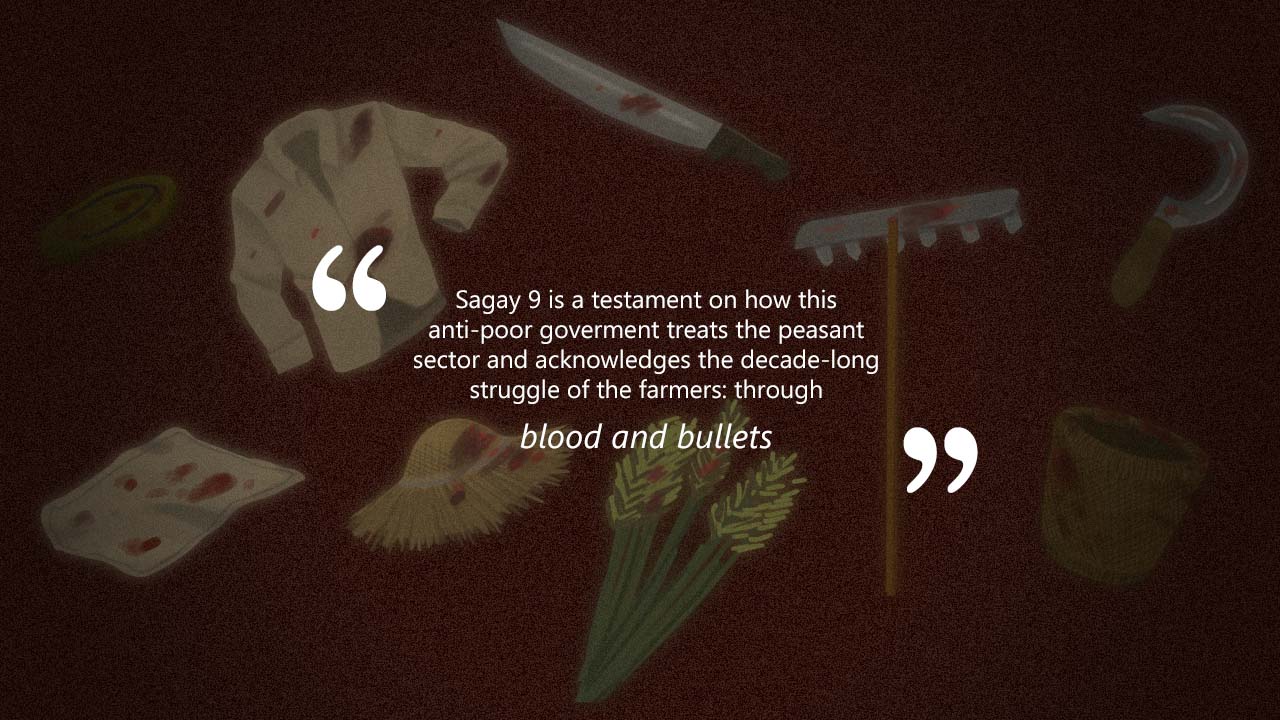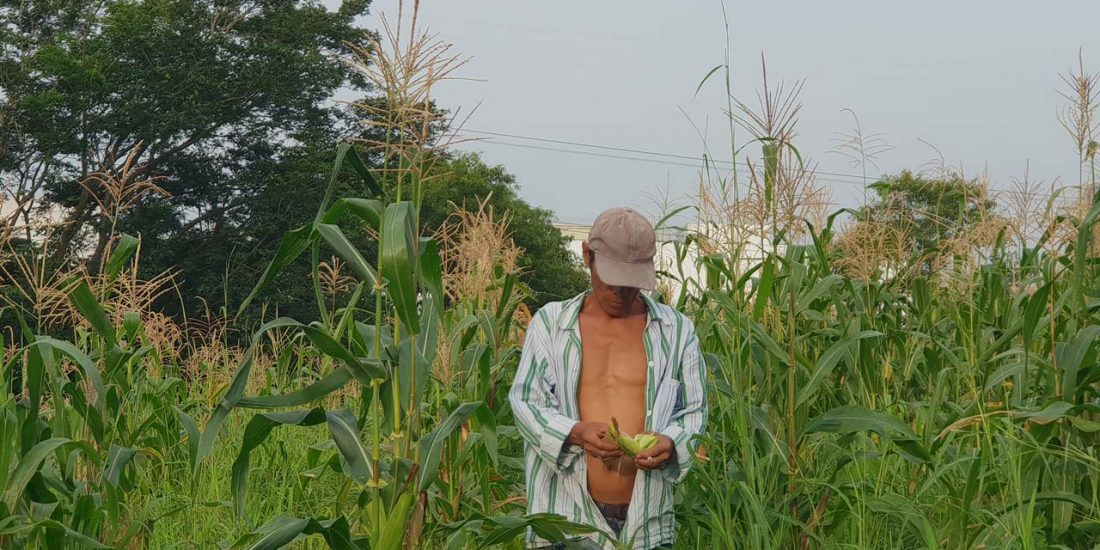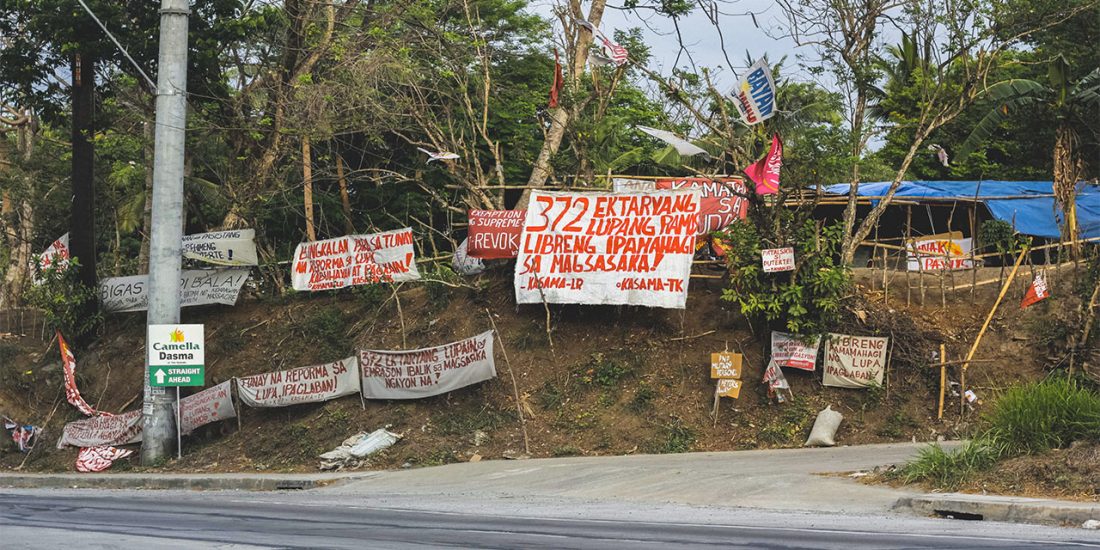On Sagay 9: Our blood-stained lands
The Filipino farmers’ struggle for genuine agrarian reform continues as strings of land ownership-related killings are reported across the country. Once again, blood has tainted the lands of our farmers—this time in Hacienda Nene in Sagay, Negros Occidental.
Sagay 9 is a testament on how this anti-poor government treats the peasant sector and acknowledges the decade-long struggle of the farmers: through blood and bullets.
On Saturday night, October 20 at around 9 PM, the 75 hectare-land owned by Atty. Barbara Tolentino known as Hacience Nene echoed gunshots, leaving nine unarmed farmers—including four women and two minors—lifeless in their own blood in their makeshift tents after tilling the land of Hacienda Nene. The defenseless victims were named Eglicerio Villegas, Angelipe Arsenal, alias Pater, Dodong Laurencio, Morena Mendoza, Necnec Dumaguit, Bingbing Bantigue, and 17-year olds Jomarie Ughayon Jr. and Marchtel Sumicad. The nine victims were with the National Federation of Sugar Workers (NFSW)—a labor union founded in 1971 to amplify the voices of sugar workers and farmers due to the Comprehensive Agrarian Reform Program’s (CARP) failure to freely redistribute the land to the tillers. Up to this day, landlord families in Negros Occidental still own 80% of agrarian land as reported by National Union of Journalists of the Philippines (NUJP) Chair Nonoy Espina. The conversation regarding CARP paved the way for the Sagay farmers to engage in a cultivation program known as a ‘Bungkalan ‘started by NFSW and Kilusang Magbubukid ng Pilipinas-Negros (KMP-Negros) to assert their rights for genuine agrarian reform and to assist sugar workers in farming during Tiempo Muerto, or the dead season of harvesting that lasts up to five months.
With a dictatorial ruling slowly revealing itself to light—unheeded power will continue to force peasants to hide in fear for the lands they fight for, so we must take the stand with them as well.
Social media buzzed with the news, and most condemned the rampant killings of farmers including progressive organizations such as NFSW, College Editors Guild of the Philippines (CEGP), Kabataan Partylist, and Anakbayan Partylist among others, pleading to end various forms of attacks and oppression against farmers. Yet amid public outrage, Department of Agrarian Reform (DAR) Secretary John Castriciones stated in a DZMM interview that the farmers of Sagay are not CARP beneficiaries and therefore illegally occupied the land of Hacienda Nene. Castriciones even claimed that the Sagay farmers were rebel sympathizers, and the massacre acted out was just mere self-defense. One of the legal requisites of self-defense according to Section 1, Article 11 of the Revised Penal Code of the Philippines is unlawful aggression—the presence of actual or imminent danger. In a press conference, three survivors of the massacre said that they did not have guns in the hacienda. The blame game did not stop as the Armed Forces of the Philippines (AFP) accused the Bungkalan for nesting CPP-NPA-NDF related activities. Philippine National Police (PNP) chief Oscar Albayalde also declared that the NPA rebels should be blamed for the massacre, not the military, not the police, nor the state.
The night will still cast a shadow of impunity onto the bodies of farmers that have been buried, along with seeds bathed in their own blood.
Currently, a National Fact-finding Mission led by human rights group Karapatan and KMP-Negros is ongoing to investigate the Sagay 9 massacre, but we cannot deny the truth that blood runs on our lands, and the Sagay 9 is a testament on how this anti-poor government treats the peasant sector and acknowledges the decade-long struggle of the farmers: through blood and bullets. It is a glaring irony that despite being an agricultural country, the Philippine government has been depriving farmers access to lands and constraining their wages in a chokehold, all while favoring with capitalist landlords under a semi-feudal agricultural system that continues to oppress our farmers and agricultural workers who feed our nation. The Hacienda Nene massacre only adds to the list of the 172 peasants killed in President Rodrigo Duterte’s term so far. Illegal arrests such as this must prompt us to stay vigilant; with a dictatorial ruling slowly revealing itself to light—unheeded power will continue to force peasants to hide in fear for the lands they fight for, so we must take the stand with them as well.
The attacks on the rights of our farmers will only persist as landlords monopolize the majority of our lands. Blood will still run in our soil until words of accountability on peasant killings and human rights violations are raised. Lest we stand with the farmers and join in their struggle, the night will still cast a shadow of impunity onto the bodies of farmers that have been buried, along with seeds bathed in their own blood.





